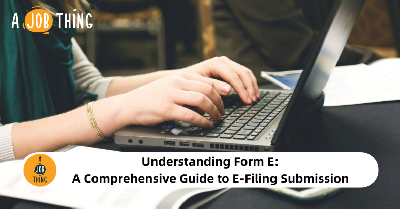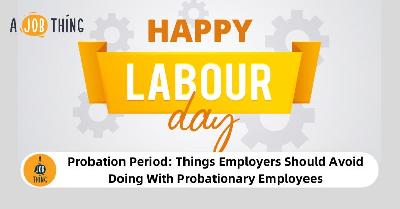
What You Need to Know About Employee Bonuses
Create Job Description Using AI
Write appealing job descriptions for any job opening to attract the most qualifield and suitable candidates. FOR FREE.
try now
Many employers prefer to pay bonuses to employees instead of giving raises, since bonuses are easier to stop than a continuing pay raise, and has an immediate positive effect on workers.
But how many types of employee bonus are there?
Employee Bonus Types
Profit Sharing
Usually, a company sets aside a predetermined amount (about 2.5 and 7.5 percent of payroll) as a bonus on top of base salary. These bonuses depend on company profits. Sometimes the bonuses are given across the board, and sometimes they are given in larger percentages of compensation the more they make.
The purpose of profit sharing bonuses is to encourage employees to let them know how their work affects the company's performance and to increase the company's profitability.
Mission Bonus (also known as Milestone Bonus)
Milestone bonuses are given to a team of employees for achieving a milestone or for completing an important project. Usually, these bonuses are offered sparingly, but they have been used more frequently in software and hardware development to encourage meeting tight deadlines. Sometimes these programs incorporate a quality measure to guard against too much focus on speed.
Sales Commission
Sales commissions are awarded to salesmen for their success in selling. These awards are usually paid out as a percentage of sales volume. Sometimes, commission percentages can increase with higher sales volume. Sales commissions are an important source of income for sales employees, making up at least 50% of total cash compensation.
Annual Bonus
An annual bonus is paid to an employee at the end of the year. This bonus is tied to an employee's performance, and the amount can vary depending on whether certain milestones are met. Year-end bonuses are usually made up of lump-sum payments used to reward the individual for hard work and dedication.
How Is Employee Bonus Calculated?
In Malaysia, there is no provisional law in Employment Act 1955 which addresses employee bonus payout. It strictly depends on the company's policy, and each company has its own way of calculating bonuses.
There are two factors at play when it comes to determining percentage of employee bonus,
- The company's profit,
- The company's top management and shareholders.
For example, the employees are divided into different groups based on their performance. The group with the best performance will receive the highest percentage of the bonus.
Advantages of Employee Bonuses
- Boosts employees’ morale and motivate them to work harder to achieve the objectives.
- If salary is tied to a bonus system, you can also regulate payroll expenditures to correlate with increases in sales, so your payroll is higher when your company earns enough to pay employees extra.
- If you structure your payroll and bonus system this way, you will need to make sure that each of your worker earns at least minimum wage even when business is slow and they don't earn much in bonuses.
Disadvantages of Employee Bonuses
- If you tie employee compensation to bonuses based on certain achievements, employees may not be motivated to do work that doesn't provide the extra bonus pay.
- If you provide bonuses for specific types of work and milestones, you may create resentment among employees who do types of tasks that don't qualify them to receive these bonuses.
- Additionally, tying employee rewards only to monetary compensation can be impersonal and counterproductive if you don't also make your employees’ work life satisfying through meaningful gestures such as sincere praise and opportunities for career advancement.
Bonus Payments Law in Malaysia
The employer has a right to choose whether or not to give a bonus on a particular year, or how much bonus they should give. A relevant case to this issue is the All Malayan Estates Staff Union v Revertex (Malaysia) Sdn Bhd.
Facts About the Case:
- The company granted bonus for the year 2014 to its workers.
- The bonus was based on a performance review of each employee conducted by their superior.
- The Company decided to not award bonus to 10 employees including the complainants because of their low performance rating.
- The Union brought an action against the Company on the ground of unfair labour practice with regards to the manner of exercising this discretion.
The Findings:
The Industrial Court cited the case of Castlefield (Klang) Rubber Estate Plc. v All Malayan Staff Union [1985] 1 ILR 124 in deciding that when the company exercises its discretion to pay out bonus in the year of 2014, it should have done so in favour of all employees and not just some. In the Castlefield case, the court held:
“In our opinion the correct interpretation of Article 49 is that the discretion is to be exercised as follows: (a) Whether or not to pay bonus; (b) if it is decided to pay, the discretion must be exercised in favour of all the employees, although the Company has the discretion to decide on the quantum payable to each employee dependent on the individual performance during the past year.”
The company claimed that they did not pay bonus to the complainants because their performance rating was “4”. But, the evidence showed that other employees who had a performance rating of “4” were given bonuses.
The court also considered that even though the complainants were placed under the Below Target Performance category, the company did not show any effort to place them in a performance improvement plan or to provide them with any additional training or to explain their weaknesses to them. The complainants were also not found to have any disciplinary issues which could have caused the complainants not to receive bonus for the year 2014.
The court concluded that the company in its prerogative to exercise its discretion of bonus payment should be exercised fairly. Paying bonus to 20 out of 30 employees who had the same performance rating was not a fairly exercised discretion by the Company. The discretion to not pay bonus for the year 2014 to the complainants equals to an unfair labour practice.
Case Summary
This case highlights the fact that the courts do have the power to examine whether employers have exercised their discretion fairly when deciding on matters like bonus payments. An important key factor here was that some employees did not receive bonuses even though their performance rating was similar to other employees who did receive bonuses.
If employers want to use performance ratings as a basis to pay bonuses, they should ensure that employees who receive the same “performance rating” are treated the same. Employers might benefit from having a transparent bonus policy so employees can be aware of the factors that are taken into account in determining bonus.
Is your company hiring? Get a complimentary consultation with our recruitment experts by posting a job at AJobThing.com
This article is based on ‘How to Calculate Employee Bonuses’ by Devra Gartenstein and 'The Law on Bonus Payments' by Donovan & Ho.





